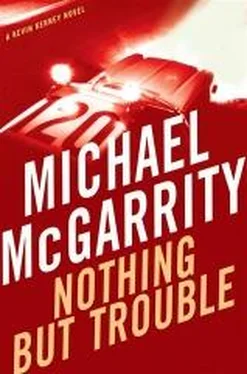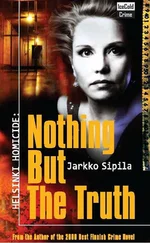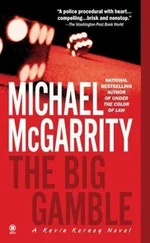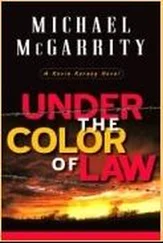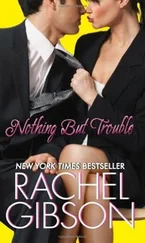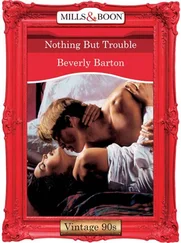Michael McGarrity - Nothing But Trouble
Здесь есть возможность читать онлайн «Michael McGarrity - Nothing But Trouble» весь текст электронной книги совершенно бесплатно (целиком полную версию без сокращений). В некоторых случаях можно слушать аудио, скачать через торрент в формате fb2 и присутствует краткое содержание. Жанр: Триллер, на английском языке. Описание произведения, (предисловие) а так же отзывы посетителей доступны на портале библиотеки ЛибКат.
- Название:Nothing But Trouble
- Автор:
- Жанр:
- Год:неизвестен
- ISBN:нет данных
- Рейтинг книги:4 / 5. Голосов: 1
-
Избранное:Добавить в избранное
- Отзывы:
-
Ваша оценка:
- 80
- 1
- 2
- 3
- 4
- 5
Nothing But Trouble: краткое содержание, описание и аннотация
Предлагаем к чтению аннотацию, описание, краткое содержание или предисловие (зависит от того, что написал сам автор книги «Nothing But Trouble»). Если вы не нашли необходимую информацию о книге — напишите в комментариях, мы постараемся отыскать её.
Nothing But Trouble — читать онлайн бесплатно полную книгу (весь текст) целиком
Ниже представлен текст книги, разбитый по страницам. Система сохранения места последней прочитанной страницы, позволяет с удобством читать онлайн бесплатно книгу «Nothing But Trouble», без необходимости каждый раз заново искать на чём Вы остановились. Поставьте закладку, и сможете в любой момент перейти на страницу, на которой закончили чтение.
Интервал:
Закладка:
“In my department it is.”
“I thought as much. Even though I’m pissed, I’ll still get that shooting script off to you. It will be on your desk tomorrow morning.”
“I’ll give it a look, Johnny.”
“Good deal. My reception is breaking up. I’ll talk to you soon.”
Johnny disconnected and Kerney spent time running a quick background check on Johnny. In Colorado, Johnny had been cited twice for speeding but had no DWI arrests on his record. The National Crime Information Center showed no outstanding wants or warrants, and there was nothing on him in the New Mexico law enforcement computer system.
Although it appeared to be Johnny’s first DWI bust, it wasn’t something Kerney could take lightly. Because Johnny could be untrustworthy and downright conniving, he decided to pay a visit to the New Mexico Film Office to learn more about the movie project. He wanted to know if it was the real deal or one of Johnny’s pie-in-the-sky fantasies.
Housed in offices on St. Francis Drive, the film office had undergone a resurgence with the election of a new governor who made trips to Hollywood to court production companies to film pictures in New Mexico. Under the governor’s watch new state laws had been passed offering tax incentives and loan subsidies to moviemakers.
Kerney introduced himself to the receptionist, a young woman with light brown hair and plucked eyebrows, and asked if someone could tell him about a movie to be filmed in the Bootheel later in the year.
Somewhat taken aback by Kerney’s uniform, the young woman cautiously asked why he was interested. Kerney told her he’d been approached to serve as a technical advisor on the project, and the receptionist passed him on to the director, a middle-aged woman named Vikki Morrison.
Trim and energetic, Morrison had short blond fluffy hair and high cheekbones. Her office walls were filled with framed, autographed photos of movie stars and posters of films shot in the state. A director’s chair at the side of her desk carried the name of one of Santa Fe’s best-known resident film celebrities. A bookshelf held a display of various shooting scripts signed by cast members, along with a carefully arranged display of copies of a book, 100 Years of Filmmaking in New Mexico.
Kerney explained his personal relationship with Johnny Jordan and asked about the movie project in the Bootheel. Morrison told him that Johnny had been a driving force behind getting the film shot in the state. He’d brokered a deal to use the nearly abandoned mining town of Playas as the production headquarters. In addition to serving as a movie set, the town would house the cast and crew during filming in the area.
Kerney knew about the town through a recent article in a law-enforcement bulletin. Built in the 1970s, Playas had once been a company town of over a thousand people. But when the nearby copper-smelting operations were shut down, it became a virtual modern-day ghost town containing over 250 homes, 25 apartments, a bank building, post office, fire station, churches, community center, air strip, and other amenities. Recently, the town had been bought with Homeland Security funds and was in the process of being transformed into a national antiterrorism training center.
Morrison explained that Johnny had been active in securing part of the financing for the movie through a low-interest state loan. He’d just finished negotiating the final details of a contract that guaranteed the state a percentage of the profits from the film.
Kerney asked Morrison to tell him about the role of a technical advisor.
“Well,” Morrison said, “it all depends on the project, the cast, and the crew. In some cases it can be a demanding, frustrating role, or it can be an enjoyable, low-key experience.”
“I’m not looking to take on something that winds up being a heavy burden.”
Morrison smiled. “I can certainly understand that. You should have an opportunity to meet with the producers and key personnel before filming actually begins. If what you learn isn’t to your liking, you can always opt out of the project.”
“That sounds reasonable,” Kerney said. He thanked Morrison for her time and left with a copy of 100 Years of Filmmaking in New Mexico, which she insisted he should have.
Johnny Jordan lived and worked in a late-nineteenth-century brick building in downtown Denver that had originally been a warehouse. The developer who renovated it had added a two-story penthouse with a wall of glass that looked out at the Rocky Mountains. It featured a large balcony, a media room, four bedrooms, two home offices, and a huge living room adjacent to the kitchen and dining area. This was where Johnny and his wife, Madeline, a partner in a law firm that specialized in corporate mergers and hostile takeovers, lived. Madeline retained sole ownership, having bought the property prior to their marriage.
Johnny loved living there, loved waking up to the city views and the distant mountains, and especially loved that it hadn’t cost him a penny.
He didn’t expect Madeline to be home, and she wasn’t. Johnny always timed his trips out of town with other women to coincide with his wife’s travel schedule. It reduced the odds of discovery. This week she was in Toronto, heading up a team of lawyers negotiating the merger of two multinational lumber companies.
Johnny cared about Madeline, maybe even loved her every once in a while when she wasn’t obsessing about her career. But like every other woman he’d been seriously drawn to and married over the years-Madeline was wife number four-she now bored him.
With all his wives he’d been faithful until the boredom set in. Then he went fishing for fresh talent. At the end of his second marriage he’d tried to figure out why he became so easily disconnected from women he thought he loved. After pondering it he’d decided most women were like well-presented but uninteresting meals: nice to look at but no fun to feast on time and time again.
When his third wife left him, Johnny had struggled briefly with the question of why he kept getting married. The only thing he could figure out was that he was too damned impulsive. With Madeline he’d thought he had chosen more wisely. In her early forties when he’d met her, she was stunning to look at, had a great sense of humor, and was extraordinary in bed. He liked the fact that she was mature, sophisticated, and successful. He dated her for a year, seeing no other women during that time, before popping the question.
After the marriage she’d held him at the banquet table far longer than any of his other wives. But that had all gone south a year ago.
In his office Johnny stuffed a copy of the screenplay in an envelope for Kerney, filled out the airbill form, and phoned to have it picked up. Then he called his lawyer and left a message about his DWI arrest in Santa Fe. Finished with the small stuff, he dialed the private office number of Bill Esty, vice president in charge of programming at a cable sports network in New York.
“Is it wrapped up?” Esty asked.
“The film office is drafting the final contract. We can move ahead.”
“Johnny, we still have some issues to clear off the table.”
“What issues?” Johnny demanded. “I’ve got a movie deal in the bag that will feature two ex-national pro rodeo stars, two up-and-coming Hispanic cowboys from the circuit, and a screenplay with a humdinger of a gut-busting rodeo in it.”
“We know all that,” Esty said slowly, “but it’s been suggested that rodeo may already be nearing its saturation point. Bull riding is on cable almost every night and the numbers aren’t moving.”
“Rodeo is more than bull riding,” Johnny said, “and right now everyone is presenting it in the same old way. Like we’ve been saying, this is a chance to do for rodeo what the X Games did for skateboarders and snowboarders. We can take this sport to the next level on your network.”
Читать дальшеИнтервал:
Закладка:
Похожие книги на «Nothing But Trouble»
Представляем Вашему вниманию похожие книги на «Nothing But Trouble» списком для выбора. Мы отобрали схожую по названию и смыслу литературу в надежде предоставить читателям больше вариантов отыскать новые, интересные, ещё непрочитанные произведения.
Обсуждение, отзывы о книге «Nothing But Trouble» и просто собственные мнения читателей. Оставьте ваши комментарии, напишите, что Вы думаете о произведении, его смысле или главных героях. Укажите что конкретно понравилось, а что нет, и почему Вы так считаете.
